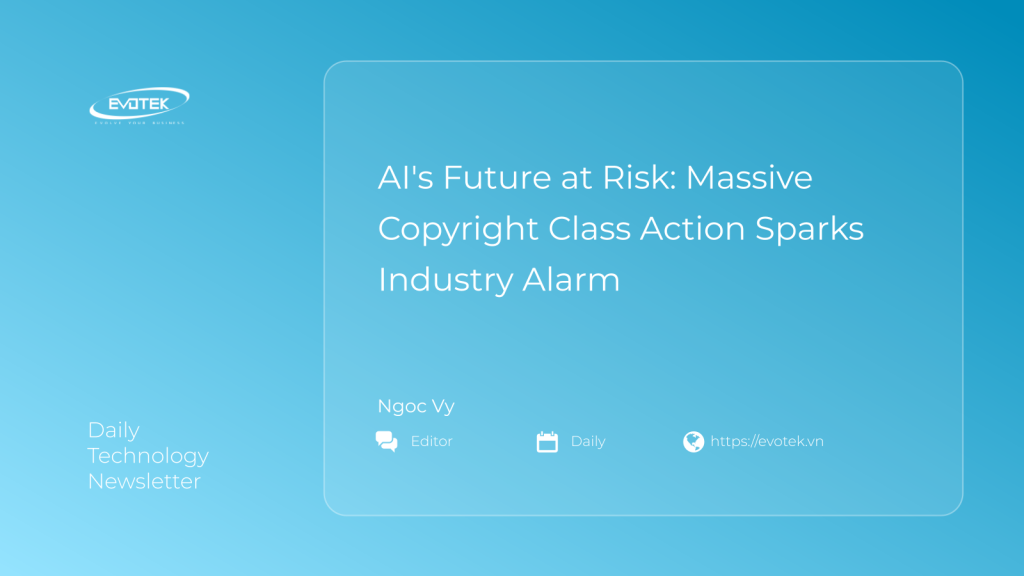The artificial intelligence (AI) industry is fervently appealing to a higher court to halt what it describes as the most substantial copyright class action ever certified. Major AI trade organizations caution that a single lawsuit, initiated by three authors against Anthropic concerning its AI training data, could lead to the financial collapse of the entire sector if millions of claimants eventually join the litigation, pressuring for a settlement.
Anthropic Faces Billions in Potential Damages
Last week, AI firm Anthropic sought to appeal the class certification, asserting that District Court Judge William Alsup overlooked critical considerations. Anthropic contends that Judge Alsup failed to perform a “rigorous analysis” of the proposed class, instead relying solely on his extensive “50 years” of judicial experience. The company warns that if this appeal is rejected, its very existence could be jeopardized.
Anthropic faces a staggering “hundreds of billions of dollars in potential damages liability” within months, stemming from a class certification process it characterizes as “warp speed.” This includes “up to seven million potential claimants” whose works span a century, with each alleged infringement potentially incurring a $150,000 penalty.
Such immense potential damages could compel Anthropic to settle rather than assert valid defenses regarding its AI training, thereby setting a perilous precedent for the burgeoning generative AI (GenAI) sector, which is grappling with numerous similar lawsuits over copyrighted training data. Anthropic emphasizes, “One district court’s errors should not be allowed to decide the fate of a transformational GenAI company like Anthropic or so heavily influence the future of the GenAI industry generally. This Court can and should intervene now.”
Industry Groups Warn of “Immense Harm” to AI Innovation
The Consumer Technology Association (CTA) and the Computer and Communications Industry Association (CCIA) have officially supported Anthropic’s appeal. In a recent court filing, these prominent industry groups warned that the “erroneous class certification” by the district court poses “immense harm not only to a single AI company, but to the entire fledgling AI industry and to America’s global technological competitiveness.”
They argue that allowing such copyright class actions for AI training will leave critical intellectual property questions unanswered and create an environment where “emboldened” claimants can force exorbitant settlements, thus stifling crucial investment in AI development. “Such potential liability in this case exerts incredibly coercive settlement pressure for Anthropic,” the groups stated, concluding that “as generative AI begins to shape the trajectory of the global economy, the technology industry cannot withstand such devastating litigation.” They caution that the United States’ leadership in AI could falter if excessive damages impede investment.
Copyright Suits: A Poor Fit for Class Actions?
Both industry advocates and author representatives contend that copyright disputes are generally ill-suited for class actions due to the individual nature of proving ownership for each work. Supporting Anthropic’s appeal, groups like Authors Alliance, the Electronic Frontier Foundation (EFF), the American Library Association (ALA), and Public Knowledge cited the Google Books case as evidence that establishing ownership is far from simple.
In the Anthropic proceedings, critics, including some author advocates, accused Judge Alsup of making broad assumptions about the 7 million books in question, likening it to “judging books by their covers.” They assert that the judge conducted “almost no meaningful inquiry into who the actual members are likely to be,” nor did he analyze the types of books, their authors, applicable licenses, rightsholder interests, or their alignment with class representatives. Despite “decades of research” and efforts by the US Copyright Office to clarify digital rights, the district court appeared to assume authors and publishers could easily resolve complex ownership issues to “work out the best way to recover” damages.
Complexities of Ownership and Notification
However, these groups emphasize that such issues are rarely straightforward. They highlight challenges such as defunct publishers complicating ownership, fragmented rights for partial works (e.g., chapters or academic inserts), and the complexities of deceased authors’ literary estates. The presence of “orphan works” – where identifying rightsholders is impossible – further compounds the problem. Critics warn that if the class action proceeds, it could necessitate “hundreds of mini-trials” to resolve these intricate details.
Concerns also extend to the notification process. The court’s proposed scheme would place the burden of notifying other potential rightsholders on the claimants themselves, despite prior large-scale cases, like Google Books, requiring tens of millions of dollars to establish registries for owner identification.
The court’s rationale that authors could simply “opt out” is also heavily criticized. Opponents argue this “lackadaisical approach” fails to address fundamental fairness and due process concerns for absent class members who might never learn of the lawsuit or prefer to pursue their claims independently. The existing disagreements between some authors and publishers regarding AI also present a potential conflict, especially if legal owners (publishers) wish to join the suit while beneficial owners (authors) do not.
A “Death Knell” for AI Development?
Advocates assert that “there is no realistic pathway to resolving these issues in a common way,” despite the district court identifying a common question solely based on Anthropic downloading the books. They caution that pursuing this path risks perpetuating uncertainty over AI training on copyrighted materials, primarily by coercing settlements rather than resolving fundamental legal questions.
Industry groups underline the “exceptional importance” of this case, given its implications for the legality of using copyrighted works in generative AI—a “transformative technology used by hundreds of millions of researchers, authors, and others.” They conclude that the “district court’s rushed decision to certify the class represents a ‘death knell’ scenario that will mean important issues affecting the rights of millions of authors with respect to AI will never be adequately resolved.”

 日本語
日本語 한국어
한국어 Tiếng Việt
Tiếng Việt 简体中文
简体中文